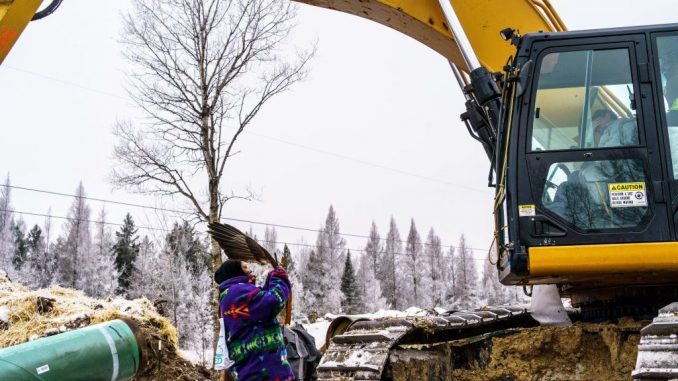

A Native American environmental activist shows an eagle feather to a construction worker in a bulldozer at the construction site for the Line 3 oil pipeline near Palisade, Minnesota on January 9, 2021. (Photo by KEREM YUCEL/AFP via Getty Images)
OAN Newsroom
UPDATED 11:52 PM PT – Sunday, April 4, 2021
Native Americans called on the Biden administration to bar Canadian energy company Enbridge from laying down an oil pipeline in northern Minnesota.
On Thursday, Native American activists gathered to protest the completion of the Line 3 Replacement Project. The halfway finished oil pipeline is meant to replace the pipeline stretching from Wisconsin to Alberta, Canada.
Opponents of the pipeline asserted Line 3 would bring damaging environmental effects to the region and comes in violation of numerous treaties between the government and indigenous groups of people.

A Native American environmental activist held a sign in front of the construction site for the Line 3 oil pipeline site near Palisade, Minnesota on January 9, 2021. (Photo by KEREM YUCEL/AFP via Getty Images)
“I’m going to implore you to cancel Line 3 for in perpetuity and any other pipelines that carry these fossil fuels,” activist Tania Aubid stated. “As for the mining also, to cancel them for in perpetuity, because that is not the way of life here in northern Minnesota.”
Proponents of the pipeline pointed to the countless jobs the project brings to a region impacted heavily by the financial effects of the pandemic.
MORE NEWS: Sen. Blunt: Infrastructure Plan Would See Bipartisan Support With More Narrow Focus On Infrastructure





Be the first to comment